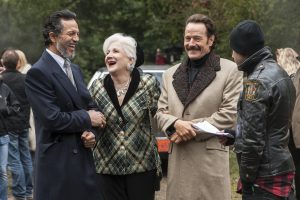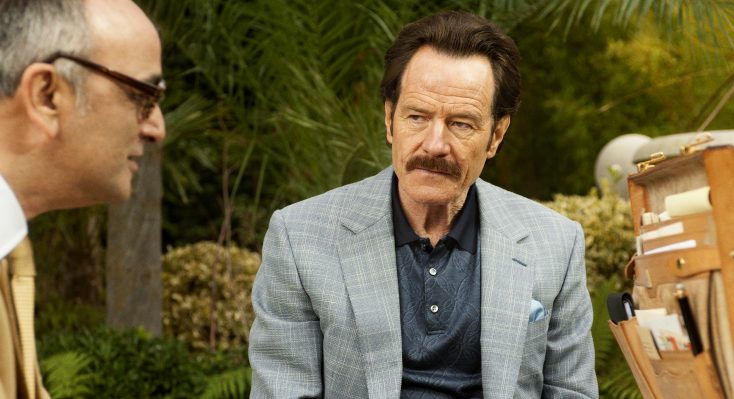
(l to r) Actors Benjamin Bratt, Olympia Dukakis, Bryan Cranston and Director Brad Furman enjoy a moment of levity behind the scenes on the set of THE INFILTRATOR. ©Broad Green Pictures. CR: Liam Daniel / Broad Green Pictures
By ANGELA DAWSON
Front Row Features
HOLLYWOOD—Oscar nominee and Emmy winning actor Bryan Cranston originally wanted to be a police officer but discovered in college that you get to make out with pretty girls—and even get paid to do it—as an actor, and so he changed his career path.
Having made a name for himself in a number of films and TV roles, most notably playing high school science teacher turned meth kingpin Walter White in AMC’s “Breaking Bad,” Cranston is enjoying the most productive time of his career. (He also won a Tony in 2014 for his performance as Lyndon B. Johnson in the play “All the Way,” in which he depicted of the larger than life 37th U.S. President and an Oscar nomination for last year’s Hollywood blacklist drama “Trumbo,” in which he played the title character, screenwriter Dalton Trumbo) Cranston revealed during an interview his initial career goal while promoting his new movie “The Infiltrator.”
The 60-year-old stars in the film as a FBI agent who goes deep undercover to infiltrate Pablo Escobar’s drug trafficking empire by posing as a slick, money-laundering businessman named Bob Musella. It’s based on the true story of real life federal undercover agent Robert Mazur, who successful built a case that led to the indictments of more than 100 drug lords and the corrupt bankers who cleaned their dirty money, along with the collapse of the Bank of Credit and Commerce International (BCCI), one of the largest money-laundering banks in the world.
The story is set in the ‘80s in Florida where shipments of cocaine freely flowed from Colombia into the U.S. Cranston, who was nominated for an Oscar for his depiction of real life Hollywood blacklisted screenwriter Dalton Trumbo, who fought to free other writers who’s reputations had been damaged, relished the opportunity to play another hero. Cranston, 60, costars alongside John Leguizamo, Benjamin Bratt, Diane Kruger and Amy Ryan in the film directed by Brad Furman from a script by Ellen Brown Furman, his mother.
Cranston spoke about playing the dedicated agent who put his life on the line to stop the bad guys, his love for his craft and his willingness to return to one of his iconic TV characters, if called upon to do so.
Q: What was your process of getting involved with this project? Did director Brad Furman contact you directly?
Cranston: Yes, I met Brad on “The Lincoln Lawyer” and we became friends and wanted to find something that we could do together. I think it was two years ago or so and I was doing a play in New York and he said, “I have it.” I go, “What do you have?” He goes, “My mother wrote this.” I said, “Your mother wrote this?” He goes, “Yeah. Trust me. She’s a good writer.” I said, “OK, all right.”
The element that I really want to bring out is Bob Mazur the man, the husband, the father, because that’s what fascinated me. As an actor, slipping in to a character and playing a character is commonplace. I’ve been doing it for almost 40 years. For him, if he makes a mistake, there aren’t any do-overs. He could be killed.
Q: Did you listen to the secret recordings Mazur made that helped indict top drug trafficker Pablo Escobar’s top lieutenant and others in his criminal network?
Cranston: Yeah, they were fascinating. They’re not always the best quality, so you’re leaning in desperately trying to listen because they’re always shrouded in a suitcase or in a planter or something. They sounded something like this (mumbling with hand over his mouth). You can’t listen to it too long because you’re concentrating so hard. Basically, what I was doing is not so much trying to get the details. What I noticed is the depth of informality that the two, Roberto Alcaino (Escobar’s top lieutenant) and Bob Mazur or Bob Musella, as he was known at the time, had.
They would rib each other. They were acting like friends. But Bob will tell you, (he) never lost it in his frame of mind what he was going to do. He’s going to arrest this guy, and so he’s acting like a friend.
Q: What kind of an undercover guy do you think you’d make?
Cranston: I think I’d make a pretty good one. I’m used to being undercover, but only pretend. Oh you meant real? On, no. No, because for that very reason that I have a bad day and I go home and “Oh, it didn’t work. You know what? It’s terrible. We’re going to have to re-shoot that scene because it just didn’t work.” That’s the repercussions in my world. I can fully divulge everything to my wife, whether she wants to hear it or not. Bob didn’t have that luxury. Early on, I was going to be a police officer. I thought that’s what I was going to do and to be a detective, but not necessarily infiltrate.
Q: What stopped you?
Cranston: Girls. Girls in theater class. It was like, (He makes a panting dog sound.). I was 19. Second year in college and I went, “You mean there’s that?” That’s available, and they outnumber boys like 8 to 1. One of my first scenes in my first acting class I read a script: A boy and a girl on a park bench making out. I was like, “Oh my God.” I read it again, and I said, “So my job is to make out with a girl? Oh my God. This is possible.” Once that turned my head around I realized if I’m going to do this, I need to learn how to do this, and I mean really learn to do this. That’s what drove me deeper into and very seriously into how does one become an actor.
Q: In “The Infiltrator,” you’re living a double life and you have to be one way when you’re undercover and another way when you go home to your family, so in real life, did you have any of those conflicts of letting the character go when you go home and you have to be Bryan?
Cranston: Sometimes they seep in to your life as you’re still thinking about the character. An actor’s job begins when you read a script. I first read a script from an objective viewpoint, because I haven’t said yes yet. It’s a very good sign, just like any of us reading a novel and you’re walking around that day and you’re thinking about that story, that’s a good sign. It’s staying with you. If the character just starts coming to you and you start to imagine what he would look like and that sort of thing, that’s a very good sign. That’s what happened with “Breaking Bad.” That’s what happened with a lot of other characters: Dalton Trumbo, LBJ. Those are indicators for me. My receptors are open to those things that I can identify well written material and when something resonates, and if something seems honest to me. Or something that I can bring an honesty to that story, then it’s a very good sign and I’m open to it.
I have a spouse (actress Robin Dearden) whom I’ve been with for 30 years and we met on a TV show. She tells me, if I’m full of myself she’ll go, “Oh, wow. Look at you.” “Don’t bring Dalton home, if he’s irascible or something. “You’re kind of a jerk.” It’s like, “Oh.” She has no gumption.
Q: Is it easy or difficult to shed characters, like LBJ for example, or Dalton Trumbo or Walter White? Were any of them really tough to kind of, especially with LBJ you have a certain accent and a way that you carry yourself. Were there times where you’re like, “I can’t get rid of this guy. He’s still in me?”
Cranston: Yeah, in some ways. It’s interesting because the way film works is that we’ve done this and we shot this over a year ago, so you have to reacquaint yourself to the story because you’re on to other stories. Some characters grab a hold of you and then don’t want to let go. You enjoy being in their shoes. LBJ was such a constant. I did five months of performances; eight shows a week on Broadway. Then there was a little bit of time off and we re-worked the script, then I slipped back in to those shoes for the movie. It was fun. It’s fun to stay in that character and play that sensibility, that era, and how the sexual politics were at the time and that sort of thing. I would say (as LBJ to a woman), “Wow I love that blouse. Look at you. I think you should wear that color all the time. I love that. Turn around, doll.” That was acceptable (socially at the time) so I just stayed in to that character and that kind of power.
Q: With all your awards and accolades, it appears that you’ve never forgotten where you came from. Did that help a little bit in your influence to come back as Zordon to the upcoming “Power Rangers” reboot?
Cranston: Yeah, actually. I did dubbing voices for “Power Rangers,” the series, 35 years ago. I can tell you that I would not have accepted that role in the movie if the script weren’t good. There’s no loyalty to something that I did 35 years ago. They completely changed the tone. It is not the television series at all. It is a fully realized, updated, reimagined approach to telling this super hero story and I hadn’t really done a super hero thing so I was kind of intrigued. ”Oh, that sounds interesting. Let’s try it.”
Q: Do you stay in touch with “Breaking Bad” and “Better Call Saul” creator Vince Gilligan?
Cranston: Oh yeah. All the time. We’re friends, so we see each other constantly.
Q: Any chance of a “Better Call Saul” cameo?
Cranston: It’s possible. I would do anything for Vince, so if he called it would certainly be something that I would say “yes” to before the conversation was over.




